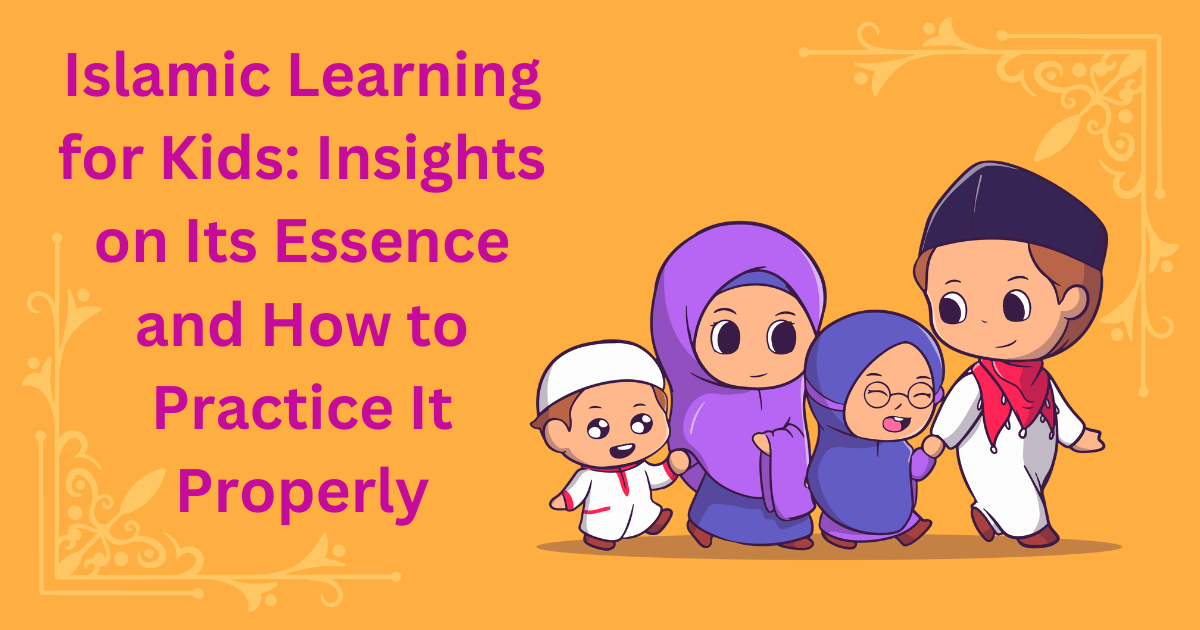Islamic learning for kids is a fundamental aspect of Muslim upbringing. It entails educating kids about the diverse range of Islamic practices, beliefs, and values. By teaching our kids about the Quran, Prophet Muhammad (peace be upon him), and Islamic history, we provide them with a solid moral compass and a strong bond with their faith.
The goal of Islamic education is to develop a strong sense of character, empathy, and a love for Allah rather than just memorizing facts. Through age-appropriate and interesting teaching techniques, kids can always gain a lifetime appreciation for their religion and its teachings.
In this article, we will discuss what Islamic learning materials we can use for kids, as well as Islamic learning videos for them. Also, we will talk about ways to learn Islam for kids and the basic knowledge of Islam for them. In addition, the 5 pillars of Islam will be explored in some detail below. We will also give some tips for learning Islam for kids.
Table of Contents
What Is Islamic Learning for Kids?
Islamic learning for kids encompasses a range of educational activities and teachings designed to introduce and immerse children in the principles, practices, and values of Islam. This learning can take place in various settings, including home, school, and religious institutions, and it often includes a blend of formal and informal educational methods.
Islamic Learning Materials For Kids:
There is a wealth of resources available to assist in educating kids about Islam in an interesting and developmentally appropriate way. Here are a few well-liked choices:
1- Islamic Resources:
Islamic resources for teaching kids about Islam are diverse and designed to make learning engaging and accessible:
A- Islamic Books and Stories:
Make sure to read with your kid(s) Islamic stories and discuss their lessons.
B- Islamic Apps:
Explore educational applications with Islamic content. It should provide the basics of Islam in a kid-friendly way.
C- Islamic Websites:
You can always enjoy high-quality Islamic content with your kid at Islamic websites that give you and your kid(s) an engaging Islamic learning environment and insights.
D- Islamic Toys And Games:
Use toys and games to reinforce Islamic teachings. It should be a game that your kid finds interesting and a game that teaches your kids through space-themed adventures.
E- Quran Recitation Apps:
If your kid is old enough to read the Quran, it is time to use some high-quality Quran recitation apps. These apps can help kids learn Quranic recitation with proper pronunciation. However, look for apps with clear pronunciation and proper Tajweed.
2- Hands-on Activities:
Hands-on activities play a crucial role in Islamic learning for kids, making the process interactive and engaging. Here are some effective hands-on activities:
A- Crafts And Coloring:
Learning can be reinforced by getting kids involved in crafts and coloring sheets with Islamic themes. You can buy a good coloring Islamic book(s) from your neighborhood bookstore and ask your kid(s) to start coloring. They will love it. This also will make their bond with Islam, Muslim characters, and Muslim identity even stronger.
B- Islamic Puzzles:
Islam-themed puzzles and card games can be both fun and educational. For example, you can use Matching puzzles. Ask your kid to match prophets with their stories, Islamic terms with their definitions, etc.
C- Role-Playing:
Acting out Islamic scenarios can help kids understand different situations and apply Islamic teachings. Also, It helps develop empathy, critical thinking, and communication skills.
You can role-play stories from the Quran. For example, role-play the story of “People of the Sabbath” (أصحاب السبت). It refers to a people mentioned in the Quran who were given the Sabbath (Saturday) as a holy day but violated it. This story is mentioned in the Quran. It is a short story with a simple plot. It has an obvious moral which is disobeying Allah entails punishment.
D- Islamic Schools:
You can sign your kid(s) up for one of the institutions that offer structured Islamic education programs for kids. There, you can be assured that your kid receives quality Islamic learning in an engaging and safe Islamic environment.
E- Local Mosques:
Many mosques offer Islamic classes and activities for kids. Make sure to make your kid(s) take part in one or more of these activities and classes.
Islamic Learning Videos For Kids:
Kids may learn about the fundamental ideas and narratives of Islam through colorful and captivating Islamic learning videos and films. These audiovisual resources are essential for forming a kid’s Islamic identity and creating a solid bond with their faith.
Here are some Islamic learning videos for kids on YouTube:
1- Alhamdulillah, Bismillah, InshaAllah | Islamic Series & Songs For Kids | Omar & Hana English by Omar & Hana – Islamic Cartoons for Kids
2- Who is ALLAH? | Animated Islamic Video for Kids | Islamic Kids National by Islamic Kids National
3- Islamic Learning for Kids | English Version | Five Pillars of Islam – feat.@SuperMuslimKids NO MUSIC by Kalam Kids – Learning Islam & Arabic for Kids
4- Our Big BIG Universe! Laith & Layla (Ep4) by One4kids
5- Ep 2 – ALLAH LOVES CLEANLINESS – Assalamualaikum Iman – Islamic Cartoon for Kids by KidsFreeQuranEducation
These videos cover a variety of topics, including the importance of saying Alhamdulillah, Bismillah, and InshaAllah, learning about Allah, the Five Pillars of Islam, and the importance of cleanliness.
How To Learn Islam For Kids?
Learning Islam for kids is a beautiful journey that involves nurturing their faith and character. Here are some effective ways:
A- Practical experience:
Practical experiences in Islamic learning for kids involve activities that allow children to apply Islamic teachings in their lives whether in real-life contexts or in games. These experiences help reinforce their understanding and practice of Islam. Some examples include:
1- Lead by example:
Kids learn by observing, so demonstrate Islamic values in your daily life and be a good example to follow.
2- Make it fun:
Make games, puzzles, and stories part of this learning journey to make learning enjoyable.
3- Be consistent:
Regular exposure to Islamic teachings helps kids build a strong Islamic foundation. Do not give your kid an instruction once and assume they will learn it and completely abide by it. You have to be consistent, track their behavior, and be always ready to correct whatever you see as Islamically wrong or inappropriate.
B- Foster a Love for Islam:
You can help your kid foster love for Islam through:
1- Sharing stories of prophets, companions, good people, and Islamic history to inspire your kid(s).
2- Introducing Islamic values. Emphasize the importance of kindness, honesty, respect, compassion, etc.
3- Celebrating Islamic occasions: Participate in Eid celebrations, Ramadan fasting, and other Islamic events.
C- Involve Your Kid in Islamic Activities:
Involving your kid in Islamic activities will give them the chance to implement their Islamic teachings in their lives:
1- Attend Mosque:
Take your kid to the mosque for Friday prayers and other Islamic gatherings.
2- Islamic Classes:
Enroll your kid in Islamic schools whenever available.
3- Volunteer Work:
Encourage your kid to participate in community service activities to instill empathy and love for other people.
4- Make Use Of Outdoor Activities:
Teach your kid(s) about Allah’s creation and how to be grateful for His blessings. Go out and connect Islam to nature.
What Is The Basic Knowledge Of Islam For Kids?
Teaching kids about Islam should be done in a simple and age-appropriate manner. Here are some fundamental concepts to start teaching your kid.
Some of the Core Beliefs that you need your kid to learn include:
1- Allah is the only God:
Explain that Allah is the only God, he is the Creator of everything, and Muslims worship only Him.
2- Prophet Muhammad:
Introduce Prophet Muhammad (peace be upon him) as the final messenger of Allah.
3- Angels:
Explain the concept of angels as beings of light that do whatever Allah commands them to do.
4- Holy Books:
Briefly mention the Quran as the final divine book for humanity and mention also other revealed scriptures like the Torah and Bible.
5- Day of Judgment:
make your kid familiar with the concept of life after death and the importance of good deeds.
What Are The 5 Pillars Of Islam For Kids?
Imagine constructing a strong house. To stand tall, it requires a strong foundation supported by sturdy pillars. Islam is comparable to a lovely house, and its solid base is composed of 5 unique elements known as the 5 Pillars of Islam.
These tenets resemble pledges made by every Muslim to Allah. They give us advice on how to lead fulfilling lives. In this context, Prophet Muhammad (peace be upon him) said:
“Islam is based on five things: the testimony that there is no god but Allah and that Muhammad is His servant and messenger, the observance of the prayer, the payment of zakat, the Pilgrimage, and the fast during Ramadan.” (Sahih Al-Bukhari and Sahih Muslim).
“بُنِيَ الْإِسْلَامُ عَلَى خَمْسٍ: شَهَادَةِ أَنْ لَا إِلَهَ إِلَّا اللَّهُ وَأَنَّ مُحَمَّدًا عَبْدُهُ وَرَسُولُهُ وَإِقَامِ الصَّلَاةِ وَإِيتَاءِ الزَّكَاةِ وَالْحَجِّ وَصَوْمِ رَمَضَانَ”.
In this Hadith, Prophet Muhammad (peace be upon him) explores the 5 pillars of Islam:
1- Shahada (Testimony of Islam):
The declaration of faith, stating that “There is no god but Allah, and Muhammad is His messenger.” This proclamation affirms the monotheistic belief in Allah and the prophethood of Muhammad.
2- Salah (Prayer):
Performing the five daily prayers at prescribed times throughout the day. These prayers are a direct link between the worshiper and Allah, fostering spiritual discipline and mindfulness.
3- Zakat (Obligatory Charity):
Giving a portion of one’s wealth (usually 2.5%) to those in need. This act of charity purifies wealth and fosters a sense of responsibility towards the less fortunate.
4- Sawm (Fasting):
Observing fasting from dawn to sunset during the holy month of Ramadan. This fast cultivates self-discipline, empathy for the hungry, and spiritual reflection.
5- Hajj (Pilgrimage):
Undertaking the pilgrimage to Mecca at least once in a lifetime, if physically and financially able. This pilgrimage represents unity, equality, and submission to Allah.
Tips For Learning Islam For Kids
Teaching Islam to kids should be a joyful and engaging experience. Here are some tips that can help you a lot in this noble journey:
1- Make It Fun And Engaging:
– Use Stories: Kids love stories. Share Islamic stories about basic Islamic teachings.
– Interactive Learning: Incorporate games, puzzles, and quizzes to make learning enjoyable.
– Visual Aids: Use pictures, videos, and crafts to help kids understand basic concepts.
2- Start With The Basics:
Introduce Islamic key terms, and teach kids words like Allah, Prophet Muhammad, the Quran, and Islam. Moreover, teach Basic Prayers; start with simple prayer practice, and gradually teach kids the movements of prayer. You should also reinforce the importance of being truthful, honest, kind, respectful, etc.
3- Encourage Questions:
Be open to receiving questions from your kid, and answer your kid’s questions honestly and patiently. Remember that the verb “ويسألونك” (“They ask you”) is recurrent in the Quran and each time, Allah Almighty commands His Messenger to answer them. See for example:
“And ˹if˺ they ask you ˹O Prophet˺ about the mountains, ˹then˺ say, “My Lord will wipe them out completely,” (َQuran, 20:105)
“وَيَسْـَٔلُونَكَ عَنِ ٱلْجِبَالِ فَقُلْ يَنسِفُهَا رَبِّى نَسْفًۭا”
Learn the Quran Online With Bayan al-Quran Native Arab Tutors:
Embark on a transformative journey of Quranic learning with Bayan Al-Quran’s comprehensive online courses. Our platform offers an authentic and immersive experience tailored to learners worldwide. Whether you’re a beginner or seeking to enhance your skills, our Tajweed courses provide expert guidance and structured learning to master the art of Quranic recitation.
🎓 Expert Guidance:
Benefit from experienced instructors who specialize in Tajweed, breaking down complex rules into manageable segments for learners of all levels.
✨ Key Features:
- Structured, step-by-step learning approach.
- Access to high-quality instructional materials.
- Real-time feedback from qualified tutors to enhance your practice.
- Flexible learning schedules to accommodate your pace and convenience.
- Immerse yourself in the melodious tones of Quranic recitation, enriching your spiritual experience.
🌟 Why Choose Bayan Al-Quran?
Join our vibrant community dedicated to perfecting Quranic recitation. Build a profound connection with the divine words of the Quran and enrich your spiritual journey. Choose Bayan Al-Quran for a transformative learning experience and embark on a path to mastering Tajweed with confidence.
You can also attend online Quran Classes with Bayan al-Quran with Native Arab tutors. There are also several courses that can help you in this regard.
Conclusion
Islamic learning for kids is crucial for fostering a deep connection with their faith. It involves educating them about the Quran, Prophet Muhammad (peace be upon him), and Islamic history in engaging and age-appropriate ways. The goal is to instill strong moral values and a love for Allah, not just rote memorization. Resources such as Islamic books, apps, and hands-on activities like crafts and role-playing are effective tools for teaching. Additionally, videos and practical experiences reinforce their understanding and appreciation of Islam. By creating a nurturing environment, parents can help their children grow into confident, faith-driven individuals who live by Islamic teachings.
All parents should comprehend that Islam is best taught to kids through a combination of parental participation and available materials. Fostering a supportive atmosphere where Islamic principles are talked about and applied can have a big impact on how well a kid understands and values their religion.
Remember that consistency and patience are essential. Always honor your kid’s accomplishments and foster a caring environment where Islam is valued.
Every kid is a unique blossom, and we may witness their faith grow into a lovely spiritual garden if we give them the time, attention, and instruction they need. Let’s strive to raise a new generation of young Muslims who not only understand their faith but also live according to its precepts and teachings.

















